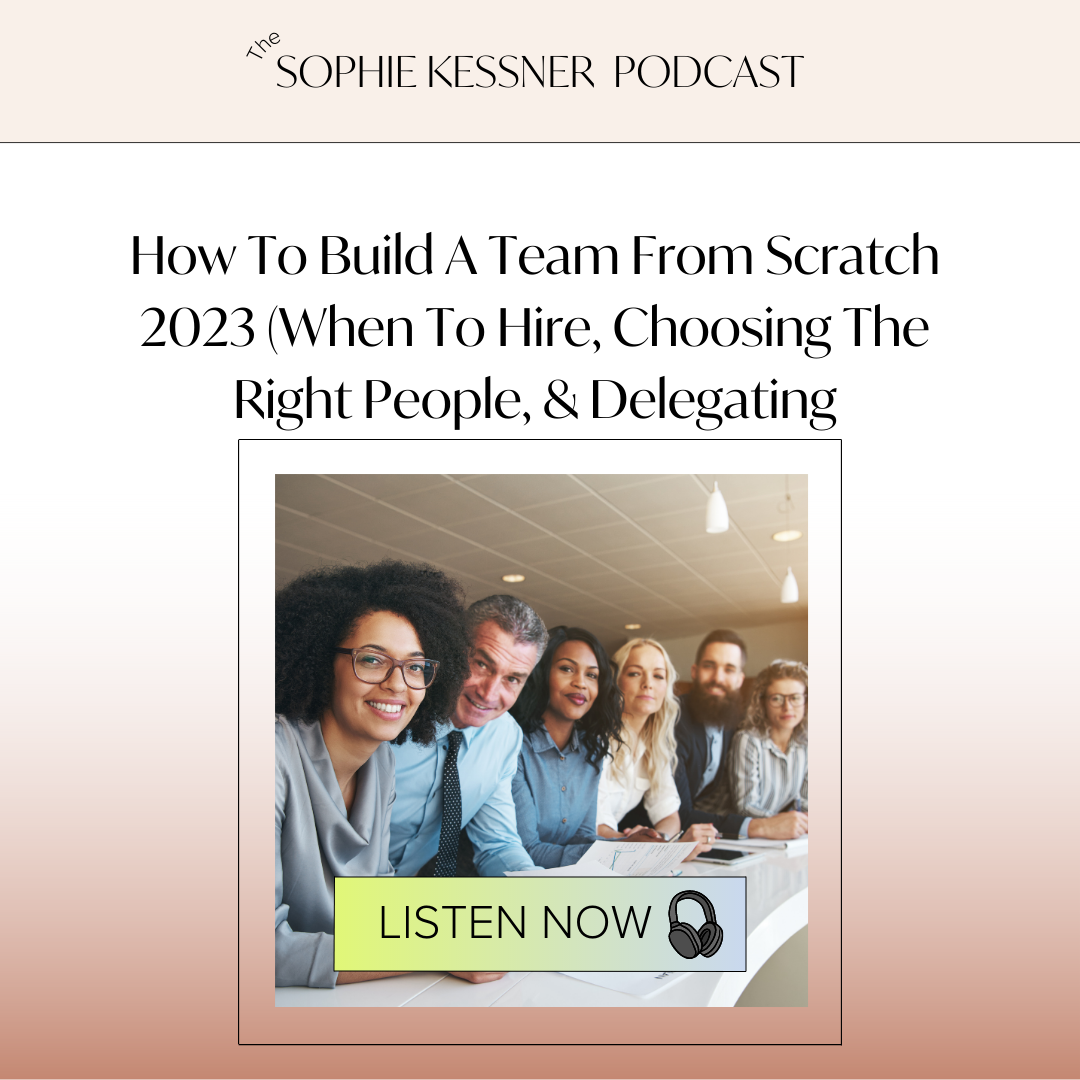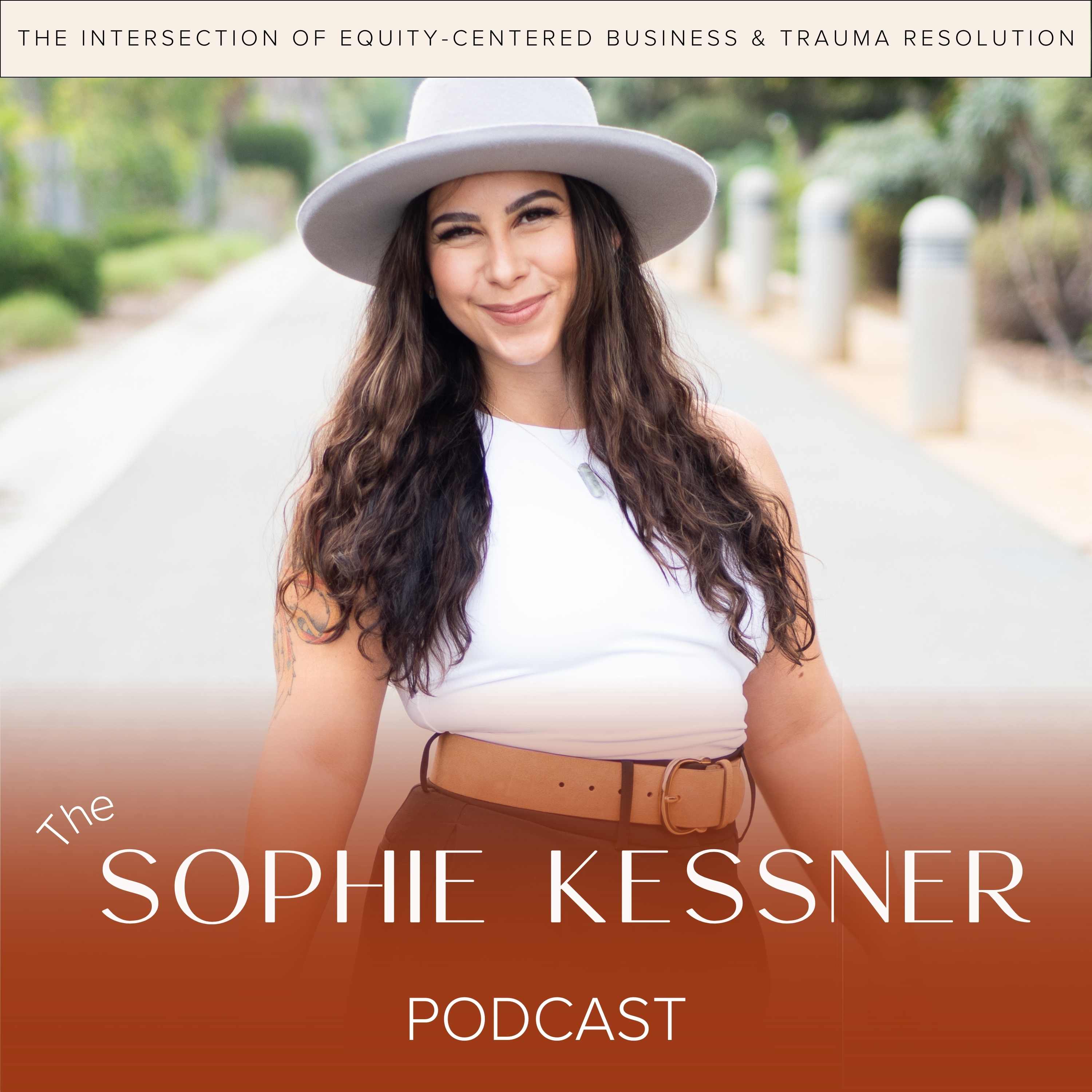Episode Transcript
Speaker 0 00:00:00 Welcome to the Sophie Kesner podcast. So few updates I wanna acknowledge before we dive in. The first is that we have rebranded and renamed the podcast. Uh, and we did that for a few reasons. One was because as I sat with what I wanted this podcast to represent the brand of the sacred c e o didn't feel like it was all encompassing. And as I sat with alternative names, the other thing that I came to conclusion with is that it's always going to be changing <laugh>. So I decided at this point, we're just going to go ahead and keep it with a thing that will likely never change, which is my name. Uh, so for further do the podcast moving forward is gonna be under the Sophie Kesner podcast. Uh, that should be updated in all of the spaces and places, but just in case. And if you are ever looking for that, that is what it is under now.
Speaker 0 00:01:17 So that being said, I want to dive into a series here as we are beginning to reopen the podcast. It's been about 3, 2, 3 years since we were consistently podcasting. Back when I had my original podcast with my old podcast cohost Stan Menlo. Uh, the podcast name was The Mind Mastery and Manifestation Podcast. We ran that from 2017 through about the end of 2020 and a little into 2021. Um, but that being said, that podcast has a lot of content, a lot of details, some of which may still be relevant, but a lot of which I would say has since evolved. And so this podcast, and really my goal with this series as I am going into a solo approach is to really provide an educational platform. There is so much that I want to share. There is so much I wanna teach. There is so much I want to educate and inform on.
Speaker 0 00:02:27 And unfortunately, a lot of platforms like Instagram, like TikTok, like Facebook, they don't allow <laugh> for the long form educational content that I really care about that I really wanna put forward. Hence why the intention for 2023 and moving forward is to continue the production of this podcast and really leverage it as one of the core pillars for my business, uh, but more importantly, one of the core pillars for how I provide content information and educate my audience. So if you'd like to stay up to date, one of the things that makes the bigot difference for this podcast to make sure that it's being seen and heard by the right people is to like and subscribe. Uh, leaving reviews, providing ratings makes a huge, huge difference. So if you are open to it, and if that feels right for you, great, and if not, that's totally okay.
Speaker 0 00:03:31 So all of that being said, let's dive in. Today's episode is on a post I made recently talking about performative business and toxic capitalism. Um, I will refer you to the blog linked to this podcast episode for the visual of this. Um, and the podcast can be, or the blog for the podcast can be found on my site at sophie kesner.com/podcast. Uh, so when we're talking about toxic, toxic capitalism and performative business, there's a few things that we wanna look at. The first is understanding what is performative business. Now, this might be a new term, this might be something you've heard before in other spaces, um, but I'm gonna define it in how I personally like to interpret the term and how we'll be using it for the context of this episode. So, performative business in my lens is looking at the way in which we show up and monetize and commod our personal lives, personality, wellbeing, and anything else that's connected to how we exist in the world, to then create an identity or a persona, usually defined as a personal brand that is selling a service or a product online, which promises for others to be able to experience a lifestyle that's similar to the one your portraying online.
Speaker 0 00:05:21 Now, why do I call this performative? Uh, a lot of the times that will, the things that we'll hear coincide with this ideology around you fake it until you make it. You embody the energy of who you wanna be in the here and now and align your vibrational frequency with that energy. And by doing so, you'll attract what you desire. Those words just came outta my mouth, <laugh>. But luckily for you, they're in much more of a satire form. And the reason being is because what I wanna do is start to unpack why this type of marketing, this type of business, has the potential to be incredibly problematic. And I say potential because there are times and spaces and places in which it might be more appropriate, but we have to be tentative to better understanding the core components of the model so that we can use it in an ethical and equitable way.
Speaker 0 00:06:42 So backtracking performative business, really what I'm hinting at here are things like luxury lifestyle brands, things like personal brands that co-op movements of personal empowerment, but really are just selling this idea of luxury freedom, having it all, being able to do what you want, be what you want, be your own boss. And we've all kind of heard and seen that over the years. Uh, and I think one of the things that's important here is to recognize that we're not demonizing or calling out or making anybody bad or wrong who's used these practices. And we're gonna pause for a second so I can adjust the gain a little.
Speaker 0 00:07:41 Oh, it's all the way down. Wow. Okay. Um, so we're not, we're not demonizing, we're not making wrong, we're not attacking by any means. But what I wanna do is look at this through a educational lens and start to unpack the different components of it so that we can start to see where there's a lot of opportunity for problems and problematic practices to exist. So when we're thinking about the luxury lifestyle brand, essentially what that looks like is you showcasing how great your life is, how powerful you feel, how high your vibe is, how awesome you are, and you're doing that to create a sense of inspiration in air quotes, excuse me, are something that's aspirational for folks that you are trying to market towards. And so how do you do that? You do that by sharing all of the awesome pieces of your life.
Speaker 0 00:08:56 You do that by trying tote to trying to do de <laugh> by trying to demonstrate a sense of authority and a sense of credibility. You talk with confidence, you lead with a powerful emotional state. You show up as quote unquote your best self. And a lot of the times, these are the brands that a lot of us fawn over. We see these folks that have seemingly perfect lives, seemingly perfect relationships, seemingly perfect personalities. Everything about them is quote unquote perfect. And oftentimes we'll also see a really interesting tactic that shows up here. And what that is, is leveraging and co-opting these pieces of authenticity and vulnerability to try to leverage themselves as not being perfect, while at the same time they're continuing to perpetuate problematic practices like utilizing virtue signaling to trigger people into buying. So let's unpack that a bit more. <laugh>. So in the graph, if you look at this inside of the blog, or you can look at all my Instagram at I am Sophie Kesner.
Speaker 0 00:10:25 Um, what we see first is this thing called laptop stifle li lifestyle lies and what Laptop Stfe <laugh>, what Laptop lifestyle Lies are, uh, are a series of ideas of beliefs, of ideologies, of concepts that we throw onto the internet. And we say, you can have this too. You can do this if you just believe, if you just want it bad enough, then you can have this. And the biggest laptop lifestyle lie that we see perpetuated in the online space is this idea of the instant success myth. Now, I, if you're looking at the image, the way that this is defined is setting unrealistic expectations of quick wins and fast cash through minimal effort and our credentials. So let's unpack that a little bit. The instant success myth is this idea that with no money, no training, no education, regardless of your background, regardless of your credibility, you too can have
Speaker 1 00:11:52 All of the success in the world. You can have a seven figure business, you can make millions of dollars. You can go climb to the top of the world, you can have the perfect relationship, the perfect body, all the confidence, and be the happy, awesome person. And you can have it like that if you just align your energy, if you just step into a high vibe, if you just yada, yada, yada, yada. So why is this incredibly problematic? Uh, because part of the strategy here is disarming a lot of the rationale and logic that most folks would typically use when it comes to making big decisions. And it's even more problematic when on the back end of doing such things is the intention to sell a service or a product. So it's one thing to share your life and share about what you're doing and how you live, and essentially just be a blogger, right?
Speaker 1 00:12:58 It's a whole different game when you're doing this to try to create an image, to try to influence and to inspire and to get people to buy into this idea that they can have it too. And then selling to them that all they need to do is be like you <laugh>, but obviously not in those terms. The things that will hear is you just need to shift your mindset, change your beliefs, change your identity, quantum leap, heal your money wounds, and all of the things of the sort. And the reason why this is really responsible is when we start to unpack the conversation, what you'll notice as part of the next piece of the cycle is this type of messaging, this type of branding will often leave folks to making high risk investments in quick fix solutions out of fomo. So that's mouthful. Let's unpack that a little bit.
Speaker 1 00:14:13 We're talking about marketing to people who are in emotionally vulnerable spaces, right? These are people who are hanging onto hope, hanging onto a sense of only if dreaming, of wishing for deeply craving and wanting that thing too, right? There's a sense of inspiration, which is why it's such a powerful hook for people. And, and then they're sold this idea that if they just invest in this thing, if they just do the work, if they ain't just heal their money wounds, line their chakras, whatever the modality being sold is that then they'll be able to have infinite wealth and exponential growth and quantum leap. And so they get rid of all the rationale and all of the parts of themselves that might question our doubt or whatever it is, because what they're sold. And part of the programming is that those are the things keeping you stuck.
Speaker 1 00:15:25 So don't listen to that part of yourself that's questioning it. Don't listen to the part of yourself that's doubting it. Don't listen to the people who are saying, I don't know if that's a good idea. I don't know if that's real, because that's the problem. And so what happens is people are spending money that they don't necessarily have. They're choosing to opt into really, really big financial investments on the gamble that in doing so, they're gonna somehow make the return and the return on an investment. So the numbers that I'm talking about here are 5,000, 10,000, 50,000 up to hundreds of thousands of dollars. We're talking about a lot of money, a lot of money, A lot of the times it's more than what people make in an entire month, even sometimes in an entire year. And so there's this idea that if I can just get past this fear, if I can just get past my limiting beliefs that this is impossible for me, and I believe hard enough, then I too can have that thing.
Speaker 1 00:16:47 So let me completely get rid of any emotional or any logic or any rationale, and do the thing out of fomo, fear of missing out, right? So another tactic that we oftentimes see is it's like, now is the time <laugh>. Now you've got to do this. Uh, and that's another thing that we'll see along with tactics around the prices going up tomorrow, I'm gonna be doubling my rates. This is the last time. And I will say there are certain pieces and certain components that are nuanced, right? When you are closing card, when you do have an actual program that you only won once a year, okay, yes, there's truth and validity to that. But one thing I don't and can't get behind is the outlandish constantly raising my rates because I feel like it randomly one day. And then using that as a scarcity tactic, even though I say it's an empowerment tactic to try to get people to buy now so that they don't miss out on those special raid, they don't miss out on the last spot.
Speaker 1 00:18:03 And when in reality that's just not true. So here's what we see these people come in, they make these big financial investments, huge, huge, huge. And <laugh>, what comes from that? If you're looking at, uh, the graphite created here are, uh, a few pieces of how it impacts that individual's system. Now I'm looking at this through a trauma trained lens, having spent the last three years training in trauma work training and symatics with over 500 plus hours of personal study and also supervised consultations. Um, and that's really what I'm, what I'm pulling on here and the research that I'm collecting. So when we make high risk investments, there's a few things that are happening, right? It it, it's this feeling of a gamble. There's this really big sense of like, oh, man, is this gonna work? And you can feel it in my voice when I'm talking about this, right?
Speaker 1 00:19:09 You go from doubting things and wondering and just kind of going through the motion to somebody providing a huge emotional shift by influencing you through their emotional state and them having such a heightened level of confidence and intensity and uncertainty that your system is like, okay, yes, I can do this, I can do this, I can do this. And what ends up happening a lot of times is it puts our system into a space of arousal and our activation. Um, or there's a charge, however you wanna look at this in the languaging that you wanna apply, feel free. Uh, but essentially the point being is we're going from living in a certain space to our systems being revved up into en heightened emotional space where then we're being conditioned to operate from, because this is us stepping into our power, right? This is us showing up as our most powerful selves.
Speaker 1 00:20:15 But oftentimes what happens, because we've made massive financial investments and massive fin financial commitments, usually without the rational attached, is now there's this sense of urgency and emergency that shows up. And what that looks like is we feel like, okay, I need to make money now so I can pay this bill on top of covering my living expenses. Now, what's also really interesting here is there tends to be a ideology around living in abundance and buying all of the things now. So what do we do? We increase the cost of living for ourselves to try to maintain an ideology and to try to maintain an image of luxury of having it all of, I'm gonna spend thousands here and thousands there and thousands on this and do all of this shopping and buy all of these things because I'm an abundant being, uh, all well racking up a ton of debt, a ton of debt.
Speaker 1 00:21:26 And I say this time and time again. And so part of the, the issue here is you are increasing your cost of living what your, what your bare minimum monthly expenses are. And if you invest in a program that's $5,000 a month, and I'm not making these numbers up folks, so sir, real numbers, people charge, they're charging you $5,000 a month and now you have to pay that on top of your rent, on top of all of your other living expenses. And let's just throw a number out there. Let's say three $4,000 a month is just your basic living expenses for food, groceries, rent, car, et cetera. That's $9,000 a month that you now have to make before you even pull a profit. That's ludicrous. But this is the reality for a lot of folks. And then we convince ourselves that we're not living in a state of urgency and that we're not living in a state of hyper arousal.
Speaker 1 00:22:35 But the reality is our systems are feeling the intensity and the urgency of needing to make money to survive. But now we've convinced ourselves that it's us living in abundance to do that. And so the the solution is buy more expensive things, invest more. And it starts to build this really interesting kind of counterintuitive culture where we say it's not hustle culture, but it is, uh, it's hustle culture disguised as feminine empowerment, uh, disguised as luxury lifestyle and ease and flow. But the reality is, if you look at this, uh, and you really get behind the scenes of, of these businesses and these needs models, is it's folks who are instead of constantly doing all of the things in their business, they're doing things as far as rituals and processes and practices and luxury things, thinking that that's gonna be the solution. And I'll say here, there's a caveat of course.
Speaker 1 00:23:54 Um, I'm all for self-care. I'm all for doing what you need to do to take care of you. And the caveat being that you do irresponsibly, <laugh>, you're not putting yourself in a financially risky position to where now you are dependent on having clients sign up and pay for your services. Because that right there is one of the core issues with this business model, right? We have to, because we don't have a baseline of financial security outside of our business, we have to create financial growth in the business to pay for the lifestyle of said business. We have to show up online, we have to market, we have to sell, we have to be con constantly launching new offer after new offer and raising our rates and keeping clients on board and keeping them on their feet. Because if we don't, we can't pay our basic expenses <laugh>.
Speaker 1 00:24:57 And that's part of the issue. Additionally, uh, if you're looking at the graph again on my Instagram or on the blog, uh, the next thing that we're looking here is the issue of paying and selling proximity to power. So we've talked about this a little bit, right? This idea that you are getting into this thing where now you are selling the thing that you are sold, that you are utilizing things like virtue signaling, privileged marketing and trying to, uh, what is the word I'm looking for here? You, you're trying to get people to invest in idea that they can have this too. And part of the problem with this is a lot of the times what we'll see is because we're living in such a high end state of an urgency, this sense of survival, right? You'll see a lot of the times there's uh, there's like panic attacks that come up here, a lot of high anxiety, really high dependency on caffeine, constantly needing a adrenaline and in your life, um, and constantly needing more.
Speaker 1 00:26:11 There's no ability to really slow down. In fact, slowing down and not doing things isn't necessarily seen as a good thing. Um, and so part of what we're seeing here is folks, because there's this increased necessity for increased revenue just to cover their expenses because their cost of living is now so high that they will then rupture their own boundaries. They will compromise their own values to try to justify what it is they're doing, but not really fully understanding the depth of what's happening and what they're doing and how it's all working. And this is really the, uh, the, the underlying piece that's really confusing and really disorienting and discombobulating, having been somebody who had gotten pooled into this kind of model and clawing my way out of it, there's a ton of guilt that you and shame that you have to unpack about where you betrayed yourself and where you fell into patterns of believing that you were doing the right thing, that you were doing it for the empowerment of other people, that you were believing in their power, that you were wanting to hold them to a highest standard and all of the other BS that's out there.
Speaker 1 00:27:53 But the reality is what's actually happening is we're leveraging privilege and we're virtue signaling to try to get people in and saying it's because we wanna empower them and help them heal in all of the nonsense. And part of the issue with this is when you're in this world, you get put into that echo chamber, right? So this is that next little part of the graph. We're talking about an isolated echo chamber that normalizes problematic practices and gas lights, opposition. So what I'm talking about here is you'll see this trend of building this high vibe community or whatever it is. And part of the way that they get people to interact is you have all of these people cheering each other on and creating this culture cel celebration. Uh, which isn't necessarily a bad thing again, or this is why this is really confusing and disorienting is because there's a lot of pieces that have the potential to be really great, but they've been warped and used in really interesting ways that are incredibly questionable.
Speaker 1 00:29:12 So you have these communities of people who are like celebrating and praising and talking to each other and, and continuing to repeat the beliefs and the ideologies of the bigger culture of what we're tackling here, right? That's just a limiting belief. That's just you, something you need to clear. That's a money block. You just have to think a different feeling thaw. That's not your problem, right? Whatever the, the languaging or the patterns are. But essentially what's happening is we start to take these feelings of like questioning and wondering like, is this actually right? This isn't working. And we begin actually gaslighting ourselves. We say, well, I'm the problem. I just need to heal more. I need to believe more. I need get rid of that limiting belief. I need to, whatever it is you're being sold and the entire community is echoing the same thing.
Speaker 1 00:30:11 And it feels like you are the crazy one. It feels like there's something wrong with you, and it can feel incredibly isolating, incredibly disorienting. And there's this sense of hopelessness that comes online, but we're also continuing to have to push through because what you're being told and sold to do is to fake it until you make it, is to show up in your power, is to believe and get rid of limiting beliefs. And this is the issue. The other part of this that kind of ties us all together, right, is that echo chamber when we're looking at social media and we will tackle the ye social media business model and, and the, uh, merchant attention merchants merchant business model in one of the future episodes. Um, but what we're looking at here is that echo chamber, that highly engaged community that's being incentivized and rewarded to constantly show up and interact and do all of the things is boosting social engagement and reach on the algorithm, which is really unfortunate because then we see all the stuff of the people that we probably don't want to be seeing, but it creates this false sense of credibility that creates this false sense of community be or community because we're looking on social media and we're seeing, wow, there's so many comments, there's so many likes, there's so many views, there's so much engagement, it has to be trustworthy.
Speaker 1 00:31:55 But what you're not seeing are all of the comments, all of the opposition that is being completely wiped down because folks aren't open to the idea of critique and healthy critique, right? We're not demonizing and saying, you're a ho, evil person. It's critiquing and questioning things. There's not space for that in this type of culture because that's a limiting belief that you just need to get rid of. And so this amplification of social engagement is actually something that platforms alike, TikTok, Instagram, Facebook, profit from. And the reason being, and we're gonna go deep into this in in the next episode here, is because these platforms want you spending as much time as possible on their platforms. So they reward the engagement and the time that you spend and they continue to push that content because folks are engaging with it. And that's how the part of their business model have them make money.
Speaker 1 00:33:03 And we'll talk about that in the next episode. But essentially again, you'll see this all interconnects because as that content is getting more engagement, the platforms are saying, oh, great, yes, continue to do what you're doing because people are staying on here longer and we're collecting more data. Thus the perpetuation of the laptop lifestyle lies, and that folks is the performative business model. And toxic capitalism, why is it toxic? It's toxic because it's selling this ideology that more, more, more is obvious. The answer, more growth, more healing, more money, do it faster, do it, then less time <laugh>. And oftentimes to no when to no avail to no consequence of what the repercussions of our actions actually are. We just ignore it or we just throw money at it and think that's gonna solve it, <laugh>. But the reality is we're not looking at the whole picture here.
Speaker 1 00:34:13 We're not seeing all of this subtle ways that this way of operating in the world, of doing business, of marketing, of selling, how it's negatively impacting and eating at us both on the individual and collective level. And this is why in my personal belief system, it's an incredibly problematic way of doing business. So that is it for today's episode. And summarizing this model, uh, obviously there was no way in hell I could fit the all of this into an Instagram reel. Um, and hopefully you're starting to understand, see why. But if you do find this helpful, um, like I've mentioned at the beginning of this episode, subscribing to the podcast, leaving reviews is one of the most beautiful ways that you could support this. Um, and you can also do that anonymously. I know some of the topics that we're gonna be talking about are fairly sensitive.
Speaker 1 00:35:18 Uh, and so I wanna acknowledge and name that, especially as we start to get into heavier conversations of anti-racism, of trauma, which we will in future episodes. But I think the biggest thing that I wanna leave you with today is if you are in the process of unpacking this concept, you're not alone. There are people who see it too, and there is a different way. So that being said, thank you for being here. Thank you for listening in, and if you have questions, you can always email at support at the sacred period, c e o, um, and that'll be in the show notes as well. All right, y'all, I will see you in the next episode. Oh,






